Have you ever wondered just how long does an asphalt roof last? Well, wonder no more because I'm here to shed some light on the topic.
As someone who is passionate about innovation and always looking for ways to improve my home, I know that understanding the lifespan of different roofing materials is crucial. And let me tell you, when it comes to durability and longevity, asphalt roofs are definitely worth considering.
So, let's dive right in. An asphalt roof can last anywhere from 15 to 30 years, depending on various factors such as climate conditions and maintenance. That's quite a significant lifespan, wouldn't you agree?
But what makes asphalt roofs stand out? Well, they are known for their versatility and ability to withstand harsh weather conditions like rainstorms and snowstorms. Plus, with proper installation and regular inspections, you can extend the life of your asphalt roof even further.
So buckle up and get ready to learn all about how you can make the most out of your investment in an asphalt roof!
Asphalt roofs last 20–25 years, but proper maintenance can extend their lifespan. Asphalt shingles are a popular roofing material due to their durability and affordability.
The roof may leak and cause damage over time due to constant exposure to harsh weather. Your asphalt roof needs regular inspections and repairs to last.
Professional installation is essential for asphalt roof longevity. Poor installation can prematurely age and reduce shingle effectiveness. Regular gutter cleaning and debris removal prevent water from pooling on the roof and deteriorating it.
Asphalt roofs are also longer due to roofing technology advances. UV and wind resistance are built into newer shingle designs. These innovations prevent sun damage, cracking, curling, and storm-related blow-offs. Selecting high-quality materials with these benefits can extend the life of your asphalt roof.
An asphalt roof can last 20–25 years with proper maintenance. Your asphalt roof will last longer with regular inspections, repairs, proper installation, and innovative roofing materials. However, every asphalt roof is different, and climate and maintenance will determine how long it lasts.
Moving on to 'roof material lifespan,' we'll compare the durability and longevity of different roofing materials.
The lifespan of an asphalt roof depends on the material. Asphalt shingles are durable and long-lasting. Asphalt shingles are popular with homeowners because they last 20–30 years.
There are several factors that affect roof lifespan.
Understanding these factors can help homeowners choose a roofing material and predict its eventual replacement.
As your asphalt shingle roof ages, watch for signs of wear and tear.
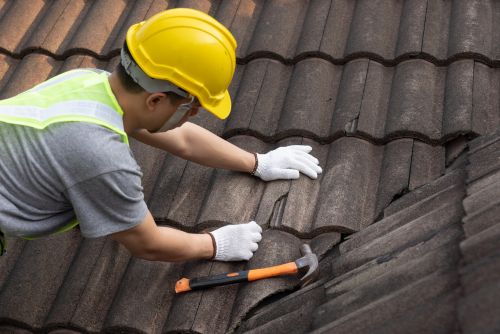
Any changes in your asphalt shingle roof's appearance or performance? The wear and tear may indicate a need for repair.
As a homeowner, I know that regular roof maintenance prolongs its life. Missing or damaged shingles on an asphalt roof indicate wear and tear. Strong winds, rain, or animals can all be the cause of these. Untreated damage can cause leaks and further deterioration.
Regular roof inspections detect wear and tear before it becomes a problem. Professional inspectors look for cracked or curled shingles and excessive granule wear. After a storm, excessive granules in gutters or downspouts are another sign. It means your asphalt shingles are losing their coating.
To preserve your asphalt roof, repair these signs immediately. Replace damaged shingles individually to prevent further damage. Water infiltration can be prevented by sealing cracks with sealants, extending the life of the roof.
I regularly clean gutters and remove moss and algae to prolong the life of my asphalt roof. I also check my attic for leaks and ceiling water stains to spot potential issues early.
For your asphalt roof to last, you must watch for wear and tear. Regular inspections, prompt repairs, and routine maintenance like gutter cleaning and moss removal can extend the lifespan of roofs.
Let's examine how weather affects your asphalt roof.
Weather affects asphalt shingle roof durability. Understand the weather conditions that can damage your roof and shorten its lifespan.
Here are four weather factors that affect asphalt shingle roof longevity:
1. Extreme temperatures: Asphalt shingles are designed to withstand a wide range of temperatures, but constant exposure to extreme heat or cold can take a toll on their durability. High temperatures can cause the shingles to become brittle and crack, while freezing temperatures can lead to shrinkage and expansion, resulting in leaks.
2. Heavy rain: While asphalt shingles are generally water-resistant, prolonged exposure to heavy rain can eventually wear them down. Constant moisture can weaken the adhesive that holds the shingles together, leading to loosening and potential water infiltration.
3. Strong winds: Windstorms pose a significant threat to any roof type, including asphalt shingle roofs. Powerful gusts can lift and tear off individual shingles or even uplift entire sections of the roof if not properly installed or maintained. Regular inspection and timely repairs are crucial in areas prone to high wind events.
4. Hailstorms: Hailstones vary in size, but even small ones can cause damage to an asphalt roof by denting or cracking the shingles' protective granules. Multiple hailstorms over time may result in weakened spots on your roof's surface, making it more vulnerable to future weather-related issues.
Understanding how these weather conditions affect your asphalt shingle roof's lifespan is crucial for proper maintenance and damage prevention. It's not just weather—proper installation is crucial. Even the strongest roofing material will fail over time without proper installation and materials.
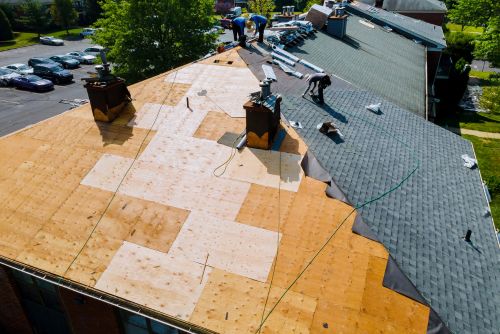
Your asphalt shingle roof's longevity depends on proper installation. Roof installation requires precision. Every step is crucial to ensuring your roof lasts for years, from material selection to technique.
High-quality asphalt shingles are chosen first for proper installation. The shingles should be strong enough to protect your home from harsh weather. Preventing water leakage and damage requires proper sealing and alignment during installation.
Be sure to prepare your roof before installing shingles. Old roofing materials must be removed, structural issues inspected, and repairs made. A smooth, solid base is essential for proper installation and will extend the life of your asphalt shingle roof.
Every detail must be considered during installation. Each shingle should be properly nailed or fastened. This process shouldn't be rushed because even minor mistakes can cause major issues.
Proper installation ensures a durable asphalt shingle roof. Other factors affect roof longevity that we must consider. Regular maintenance, climate, and material quality are examples. Addressing these factors holistically will ensure that your roof lasts for years without sacrificing functionality or aesthetics.
How long does an asphalt roof last? Maintenance is crucial to the lifespan of your asphalt shingle roof. Proper maintenance can extend the life of your asphalt roof, as with any roof. Routine inspections and prompt repairs can prevent small issues from becoming major repairs.
Regular debris removal and gutter cleaning will also protect your roof. To detect issues early, hire a professional roofing contractor for periodic inspections and maintenance.
Installation quality also affects asphalt roof longevity. An improperly installed roof can cause premature deterioration even with high-quality materials. Asphalt shingle contractors must be experienced and reliable. Correct nail placement, ventilation, and chimney and vent flashing will be ensured during installation. Installing an asphalt roof properly extends its lifespan.
Your asphalt roof's lifespan also depends on the local weather. Extreme temperatures, heavy rains, hailstorms, and prolonged sunlight can accelerate roofing material wear. Installing impact-resistant shingles or a reflective coating on your asphalt roof may be wise if you live in a harsh climate.
Proper installation by experienced professionals, regular maintenance, and local weather conditions all affect asphalt roof longevity. Considering these factors and taking precautions or upgrading when needed can extend the life of your roofing system. Although factors vary, asphalt shingle roofs last 15–30 years with proper maintenance.
After discussing how regular maintenance and installation quality affect asphalt roof lifespan, let's discuss some common roofing materials and their durability.
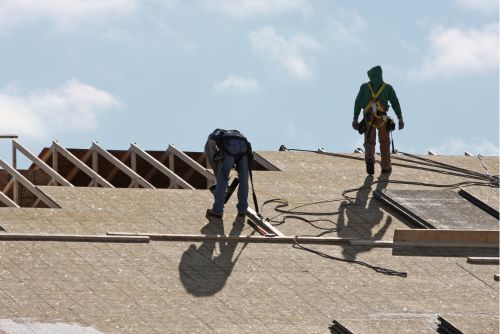
Explore common roofing materials for a durable, versatile roofing material. A durable and versatile asphalt roof is a popular choice.
Depending on material quality and installation, an asphalt shingle roof should last 20–30 years. Your shingle roof can last longer with proper maintenance.
Asphalt roof longevity depends on shingle quality. Longer-lasting materials are usually better. Extreme temperatures or frequent storms can damage shingles, so choose ones that can withstand your climate.
In addition to choosing high-quality shingles, proper installation is essential for roof longevity. Poorly installed shingles may not protect against water damage or strong winds, shortening their lifespan. Professional asphalt roof installers are recommended.
Asphalt roofs need regular maintenance to last longer. Cleaning gutters prevents water buildup that can cause leaks or rotten underlayment. Regular roof inspections allow you to spot problems early.
These factors should be considered when choosing a common roofing material like asphalt and following proper maintenance to extend its lifespan. Let's talk about roof maintenance tips without compromising its integrity.
Your roof needs regular maintenance to last and protect your home and family from costly repairs. Following these roof maintenance tips can extend the life of your asphalt roof and prevent leaks and shingles from breaking.
1. Inspect your roof regularly: Set aside time every six months to visually inspect your roof for any signs of damage or wear. Look for missing or cracked shingles, loose flashing, or any other visible issues. Catching problems early can help prevent them from escalating into bigger, more expensive repairs.
2. Clean debris off the roof: Leaves, branches, and other debris can accumulate on your roof over time. It's important to remove this debris regularly as it can trap moisture and cause rotting or mold growth. Use a broom or leaf blower to gently sweep away any loose debris.
3. Clear out gutters and downspouts: Clogged gutters can lead to water backup, which can seep under the shingles and cause leaks. Make sure to clean out your gutters regularly and ensure that downspouts are clear of any obstructions so that water flows freely away from your roof.
4. Schedule professional inspections: While regular visual inspections are important, it's also a good idea to have a professional roofing contractor inspect your roof every few years. They can identify hidden issues that may not be immediately apparent and provide necessary repairs or maintenance.
These simple maintenance tips can extend the life of your asphalt roof and save you money on repairs. Small issues handled quickly can prevent larger ones.
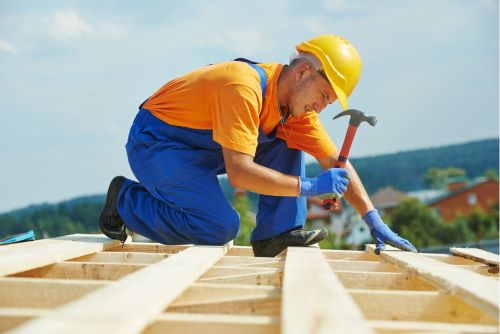
There are many ways to prolong the life of your roof. When your roof is beyond repair, it may need to be replaced. Choosing the right roofing material is crucial.
Durability, cost, and aesthetics are important with so many options. Asphalt roofs are popular with homeowners.
Due to their durability and affordability, asphalt roofs have grown in popularity. A well-maintained asphalt roof can last 20–30 years. They are ideal for those seeking a cost-effective, long-term solution. Asphalt shingle materials come in many styles and colors, so you can match your roof to your home's exterior.
Asphalt roofs last a long time because they can withstand harsh weather. These roofs shield your home from extreme heat and rain. Their fire and wind resistance add security to your property.
Though durable, even the most durable roofing material will need replacement. Weathering, aging, and normal wear and tear can damage your roof. A roof replacement may be needed if you notice missing shingles or attic leaks.
Transition: Now that we've covered asphalt roof lifespan and roofing material selection, let's discuss roof replacement timing.
Knowing the signs that your roof needs replacing is crucial. When deciding to replace a roof, look for these signs:
1. Age: An asphalt roof typically lasts between 20 and 30 years. If your roof is reaching or surpassing this age range, it may be time to consider a replacement.
2. Shingle Condition: Take a close look at the condition of your shingles. Are they cracked, curled, or missing? Damaged shingles can lead to leaks and further problems down the line.
3. Water Damage: If you notice water stains on your ceilings or walls, it's a clear sign that your roof has been compromised and needs attention. Don't wait until it becomes a major issue – act promptly.
These signs will help you decide when to replace your asphalt roof. Since homeowners are naturally innovative, we should always improve our lives, including our roofs.
After discussing when to replace a roof, let's quickly discuss asphalt shingle roof benefits.
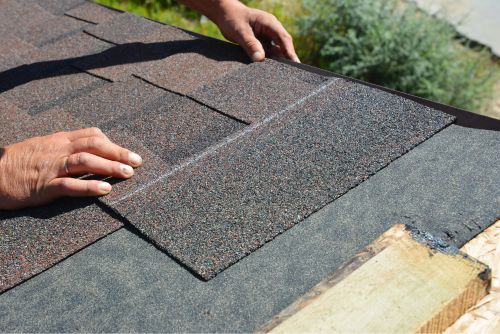
Asphalt shingle roofs can modernize your home's appearance. Asphalt shingle roofs come in many colors and styles, so you can find one that matches your home's architecture and color scheme. Asphalt shingles can be used to create a cohesive and attractive exterior in either traditional or modern styles.
Asphalt shingle roofs add beauty and other benefits to your home. Durability is an advantage. Asphalt shingles can withstand strong winds, heavy rain, and hailstorms if properly installed. This makes them ideal for homeowners in unpredictable climates.
Affordable asphalt shingle roofs are another benefit. Asphalt shingles are cheaper than metal or tile but still high-quality. Properly maintained, they last a long time and are cost-effective. If shingles break, they can be replaced instead of the roof.
Finally, regular maintenance extends the life of an asphalt roof. Maintaining your roof and checking for damage or wear will keep it in good condition for years. Be proactive to avoid costly repairs or premature replacement of your investment.
Asphalt shingle roofs offer more than just a new look. These roofs offer homeowners who want style and functionality contextually relevant benefits like durability, cost-effectiveness, and easy maintenance and repair. Spending money on an asphalt shingle roof and protecting it from damage will give you a durable, attractive roof.
You must actively maintain and protect your sturdy, attractive roof to protect it from damage. Preserving your roof investment requires regular maintenance.
Keeping an asphalt roof clean and debris-free extends its lifespan. Regularly removing leaves, branches, and other debris prevents gutter clogs and improves water drainage. In strong winds or storms, trimming overhanging tree branches can protect the roof.
Quickly fixing problems is another way to protect your asphalt roof investment. Minor issues like missing shingles or leaks should be addressed immediately to prevent further damage. Ignoring these issues can lead to bigger issues that require roof replacement or higher repair costs. Repairing smaller damage quickly may extend the life of your asphalt roof.
Asphalt roofs need regular inspections to protect your investment. Professional inspections can spot issues that the untrained eye may miss. These inspections should be done annually, but they can be helpful after hail storms or hurricanes. Early detection allows for quick repairs and prevents larger issues.
Protecting your asphalt roof investment requires proactive maintenance and prompt problem resolution. Keep your roof clean, repair it quickly, and inspect it regularly to extend its lifespan and avoid costly replacements.
In the next section on 'the importance of regular inspections', we'll discuss how these inspections help your asphalt roof last without compromising its appearance or performance.
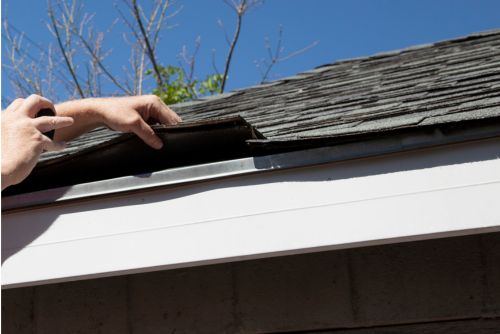
Keep your roof inspected regularly to maintain its durability and appearance!
Your asphalt roof needs regular inspections to last longer. Early detection and resolution can prevent larger, more costly issues. Here are four reasons why regular inspections matter:
1. Early Detection: Regular inspections allow you to catch any potential problems before they escalate. From loose shingles to small leaks, identifying these issues early on gives you the opportunity to address them promptly and prevent further damage.
2. Preventative Maintenance: Inspections provide an opportunity for preventative maintenance, which helps prolong the life of your roof. By taking proactive measures such as removing debris, cleaning gutters, and repairing minor damages, you can ensure that your roof remains in optimal condition.
3. Cost Savings: Investing in regular inspections can save you money in the long run. By catching problems early on and addressing them promptly, you can avoid expensive repairs or even premature roof replacement. Regular maintenance is far more cost-effective than dealing with major roofing issues that could have been prevented.
4. Peace of Mind: Knowing that your roof is regularly inspected provides peace of mind. It eliminates any worry about hidden damage or unseen issues that could compromise the integrity of your home's most vital protection against the elements.
As we discuss 'roofing warranty considerations,' remember that regular inspections protect your investment and ensure a long-lasting roofing system.
When installing or replacing a roof, it's important to understand manufacturer warranties. These warranties give you peace of mind and reveal the average lifespan and durability of your roofing material.
Consider more than just coverage length when choosing a roofing warranty. A longer warranty may be appealing, but it's important to know what's covered. Some warranties cover only manufacturing defects, while others cover extreme weather or improper installation.
Additionally, consider the roof type you're installing. Materials last different amounts of time and require different care. Asphalt roofs typically last 20–30 years, depending on the climate and maintenance. Understanding these differences can help you choose a roofing material for your home.
By researching and comparing roofing warranties, you can ensure you are buying a high-quality product that will last. A comprehensive warranty protects your investment and shows the manufacturer's confidence in the product's durability and longevity.
After discussing roofing warranties, let's examine some factors that may shorten your asphalt roof's lifespan.
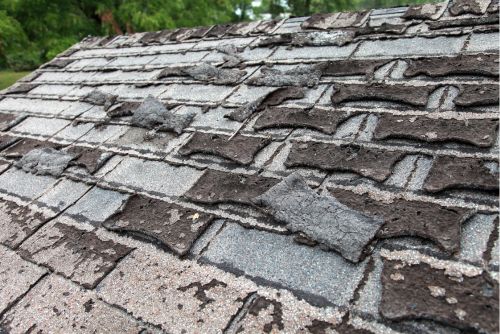
Lack of maintenance and repairs can shorten the lifespan of your asphalt roof. Keeping your roof in good condition and preventing major issues requires regular maintenance. This includes checking your roof for missing or damaged shingles and fixing any problems immediately.
Take care of small repairs as they arise to avoid larger, more expensive issues. Quality installation materials can also shorten the lifespan of asphalt roofs. Low-quality roofing materials can shorten your roof's lifespan. High-quality asphalt shingles that can withstand the elements will protect your home for years.
Buying durable materials upfront can save you money by extending your roof's life. Environmental factors can also reduce the lifespan of an asphalt roof. High winds, heavy rain, snowstorms, and hailstorms can damage your roof over time.
Solar UV rays can also degrade asphalt shingles and reduce their effectiveness. To reduce these factors, use proper installation methods and add a reflective coating to the shingles. Finally, poor attic ventilation can shorten the life of your asphalt roof.
Heat and moisture in your attic can prematurely deteriorate roofing materials without proper ventilation. Shingles can warp or curl due to heat or mold growth from trapped moisture. Proper attic ventilation achieves air circulation, temperature control, and humidity regulation.
Asphalt roofs typically last 20–30 years, but several factors can shorten their lifespan. Poor maintenance and neglecting repairs shorten roof lifespans. Poor attic ventilation, extreme weather, UV exposure, and subpar installation materials can also shorten the lifespan of asphalt roofs.
You can prolong the life of your roof and protect your home by proactively addressing these factors.
In conclusion, I've learned that how long does an asphalt roof last can vary depending on several factors. However, on average, an asphalt roof can last anywhere from 20 to 30 years.
It's important to note that proper installation and regular inspections are key in ensuring the longevity of your roof.
Additionally, weather conditions play a significant role in determining how long your asphalt roof will last. Harsh weather such as extreme heat or heavy rain storms can cause wear and tear over time. Therefore, it's crucial to take protective measures and perform routine maintenance to extend the life of your roof.
Overall, investing in a high-quality asphalt roof and taking proactive steps to protect it will go a long way in maximizing its lifespan. By being aware of signs of wear and tear, conducting regular inspections, and considering warranty options, you can ensure that your asphalt roof lasts for many years to come.
I highly recommend having your asphalt roof inspected at least once every three to five years. Regular inspections are crucial in identifying any potential issues early on and preventing major damage or costly repairs down the line. By staying proactive, you can ensure that your roof remains in optimal condition and extend its lifespan.
Investing in regular inspections not only helps maintain the integrity of your roof but also aligns with our innate desire for innovation by actively seeking ways to improve and protect our assets.
So don't wait until problems arise, schedule a professional inspection today and stay ahead of the game!
Asphalt shingles can be installed yourself, but professional installation may be needed for a durable roof.
DIY projects are empowering and cost-effective, but roofing requires proven skills and knowledge. Their expertise allows them to accurately measure and cut shingles, seal them to prevent leaks, and ventilate your roof.
Hiring professionals saves time and effort and ensures your roof is installed properly, maximizing its durability and longevity.
If you want an innovative roofing method, consider professional asphalt shingle installation.
The most common signs of wear and tear on an asphalt roof are fairly easy to spot. First, keep an eye out for cracked or missing shingles. These can be a clear indication that your roof is starting to deteriorate. Additionally, if you notice any curling or buckling of the shingles, it's time to take action.
Another sign to look for is the presence of granules in your gutters or downspouts. As asphalt roofs age, they tend to lose these protective granules, which can lead to further damage and leaks.
Lastly, be sure to inspect your roof for any signs of sagging or water stains on the ceiling inside your home - these are telltale signs that there may be a problem with your roof's structural integrity.
By being proactive and addressing these issues early on, you'll not only extend the life of your asphalt roof but also protect your investment in innovative roofing solutions down the line.
Certain weather conditions can shorten the lifespan of an asphalt roof. Extreme heat can accelerate shingle deterioration, cracking, or curling.
High humidity promotes moss and algae growth, which accelerates degradation. However, extreme cold can make asphalt shingles more brittle and vulnerable to ice dams and snow loads. Roofs in areas with frequent hailstorms or strong winds may have punctures or loosened shingles.
To determine how long an asphalt roof will last in a given location, these factors must be considered.
Other than material quality, several factors can affect asphalt roof longevity. Proper installation is crucial. Incorrect roof installation can cause leaks and damage, shortening its lifespan. Regular maintenance also matters. The roof must be cleaned and inspected regularly for wear and damage. Over time, heavy rain, high winds, and intense heat can damage an asphalt roof.
Finally, roof maintenance can affect its longevity. You can extend the life of your asphalt roof by addressing issues quickly and investing in repairs or upgrades.